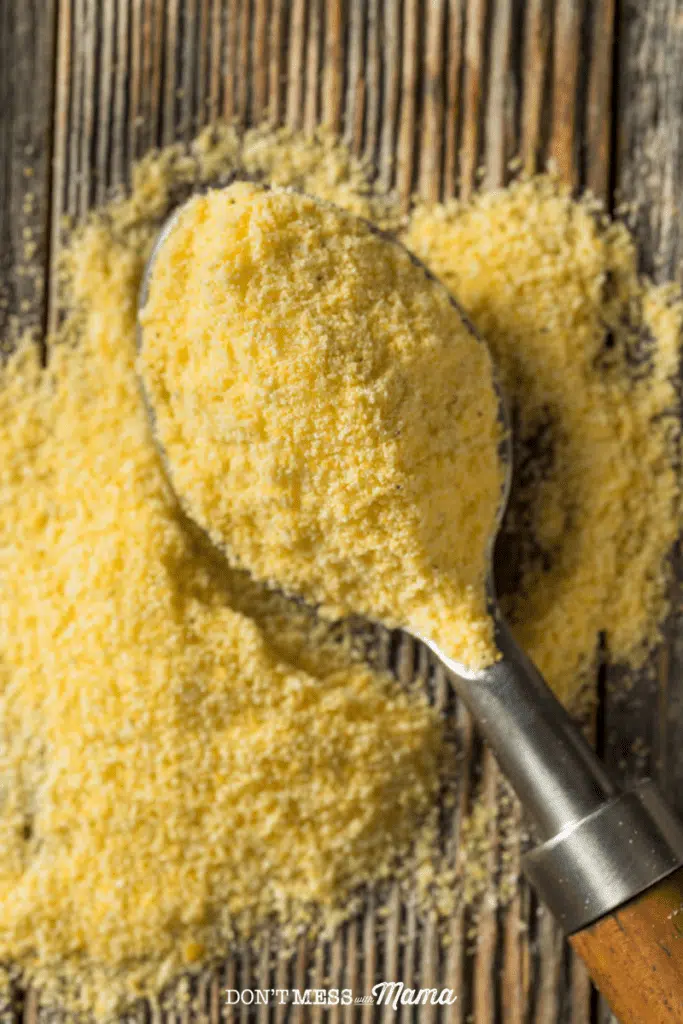6 Natural Homemade Weed Killers
Got garden weeds? You don’t need harsh chemical, store-bought weed killers to get rid of them. You can make weed killer homemade with ingredients you probably already have like white vinegar, lemon juice, dish soap, and baking soda.
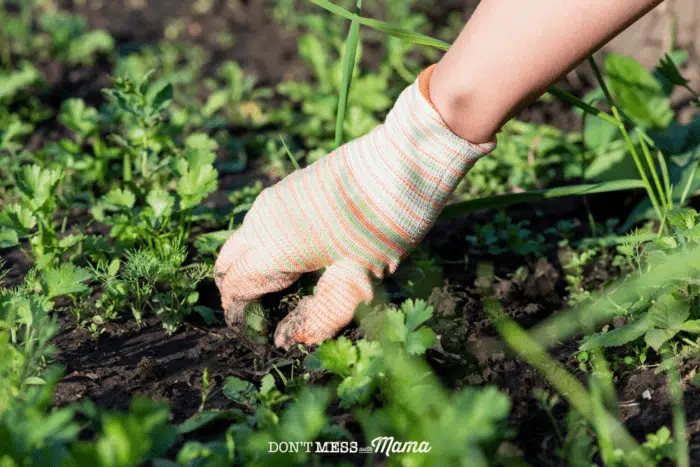
This post contains affiliate links. Please read my affiliate disclosure.
Frustrated by weeds in your garden? While commercial weed killers can be effective, they often contain harsh chemicals that can harm both the environment and your health. Luckily, there are plenty of natural alternatives that are effective weed killers without the chemicals.
Why Use a Homemade Weed Killer in Your Home Garden
- They are safer for the environment. Unlike commercial herbicides are made with chemicals that can harm beneficial insects, animals, and even water sources, homemade weed killers are generally safer for the environment and don’t pose a threat to wildlife.
- They are safer for your health. Commercial herbicides contain chemicals that can be harmful to humans, causing skin irritation, respiratory problems, and other health issues. Natural weed control is generally safer for your health, as they don’t contain harsh chemicals.
- They are more affordable. Commercial weed killers can be expensive, especially if you have a large garden. You can make a homemade weed killer recipe with ingredients you already have on hand, making them more affordable.
- They can be used to prevent weeds. Use a homemade weed killer such as corn meal to prevent weeds from the start to keep your garden free from pesky weeds.
Common Ingredients to Make a DIY Weed Killer
Many common household items can be used to control weeds naturally, including:
- Vinegar: Contains acetic acid to kill weeds and dry them out
- Salt: Dehydrates weeds, making them dry out
- Dish soap: Break downs the waxy coating on weed leaves, making them more susceptible to natural weed killers
- Boiling water: Destroys weeds with high heat
- Cornmeal: Prevents weeds from growing
- Lemon juice: Dries out weeds with its high acidity (like vinegar)
- Epsom salt: Dehydrates weeds by drawing water out of the plants
- Baking soda: Alters the pH balance of soil, making it difficult for weeds to grow
Homemade Weed Killer Recipes
Make your own homemade weed killer with one of these recipes. Be sure to spot test first.
1. Vinegar Weed Killer
Vinegar is a simple weed killer due to its acidity. Just regular a white vinegar solution at 5% will dry out and kill weeds on contact. It’s best to use it as a spot treatment in places like sidewalks, concrete walkways, etc.
Ingredients
- White vinegar or apple cider vinegar
- Spray bottle
Instructions
- Pour undiluted white vinegar into a spray bottle.
- Spray directly onto the leaves and stems of the weeds, making sure to cover them thoroughly.
- Reapply as needed until the weeds die off completely.
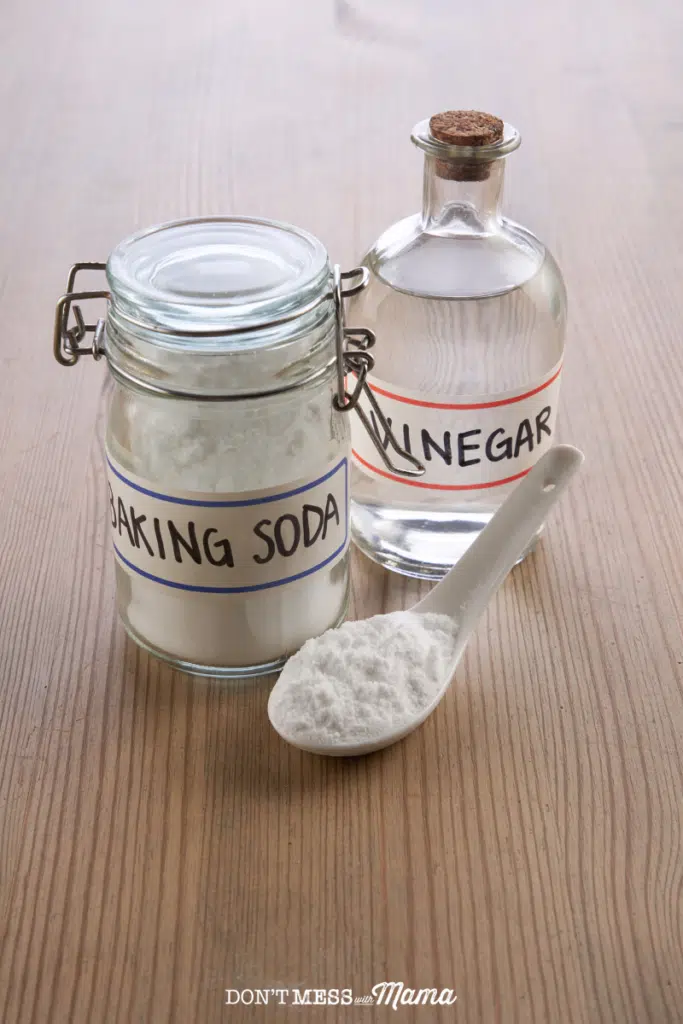
2. Vinegar, Salt Dish Soap Weed Killer
One of the strongest homemade weed killers is a simple mixture of household vinegar and salt. The dish soap sticks to the leaves and stems of the weeds, while the acid in the vinegar helps to kill the weeds and the salt dehydrates them. It’s great to use on stubborn weeds.
Ingredients
- 1 gallon white vinegar
- 1 cup table salt or Epsom salt
- 1 tablespoon dish soap
- Spray bottle
Instructions
- In a large pot over medium heat, add vinegar and salt.
- Mix until the salt dissolves.
- Remove from heat and stir in the dish soap.
- Allow the mixture to cool.
- Transfer the mixture to a spray bottle.
- Spray directly, especially the leaves and stems. Let sit for a few days.
- When the weeds have browned and died off, gently pull them out.
- Reapply as needed until the weeds die off completely.
3. Boiling Water Weed Killer
Believe it or not, boiling water can naturally kill weeds. The heat from the boiling water kills weeds completely, especially if you pour it over the stems to get to the roots.
It’s very easy to do. Just heat water to a boil in a large pot. Pour boiling hot water over the weeds, especially the leaves and stems. Let sit for a few days. When the weeds have browned and died off, gently pull them out. Reapply as needed until the weeds die off completely.
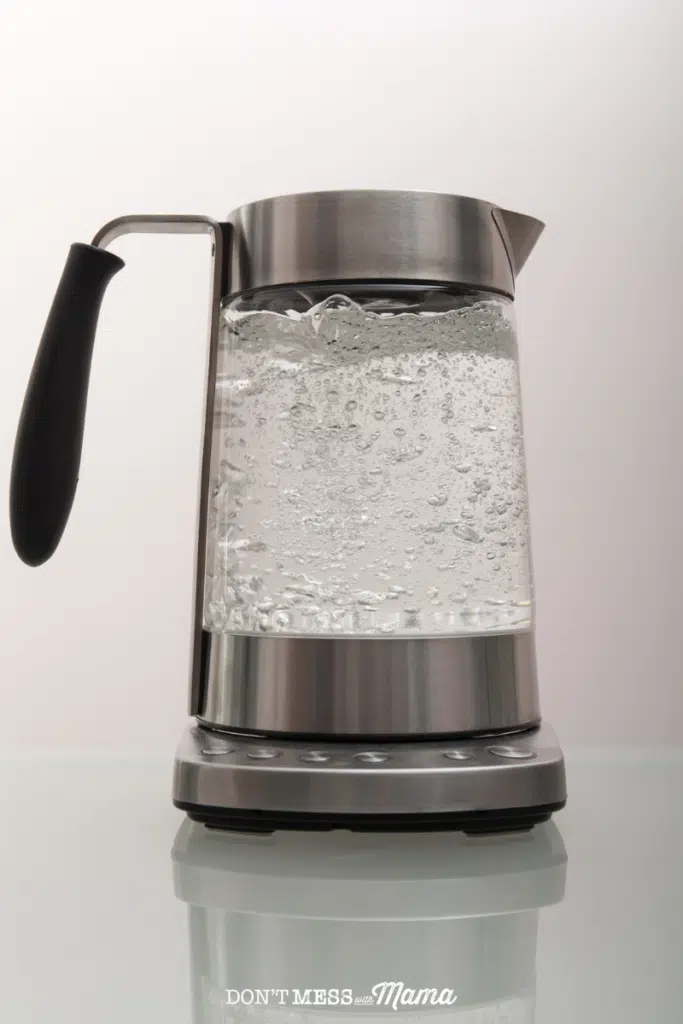
4. Lemon Juice Weed Killer
Lemon juice can be an effective natural weed killer due to its high acidity, like vinegar.
Ingredients
- Lemon juice
- Water
- Spray bottle
Instructions
- Mix equal parts lemon juice and water in a spray bottle.
- Shake the bottle to mix the solution well.
- Spray directly, especially the leaves and stems. Let sit for a few days.
- When the weeds have browned and died off, gently pull them out.
- Reapply as needed until the weeds die off completely.
5. Baking Soda Weed Killer
Baking soda can be an effective natural weed killer due to its ability to alter the pH balance of soil, making it difficult for weeds to grow. Here’s how to use baking soda to kill weeds:
Ingredients
- Baking soda
- Water
- Spray bottle
Instructions
- Mix 1 tablespoon of baking soda with 1 quart of water in a spray bottle.
- Shake the bottle to mix the solution well.
- Spray directly, especially the leaves and stems. Let sit for a few days.
- When the weeds have browned and died off, gently pull them out.
- Reapply as needed until the weeds die off completely.
6. Corn Meal Weed Killer
Cornmeal that you use to make homemade cornbread can also be used as a natural weed growth prevention. Cornmeal is a pre-emergent herbicide, meaning it prevents weed seeds from germinating.
To use it as a DIY weed killer, sprinkle cornmeal over the soil where you want to prevent weeds from growing. Water the area lightly to help the cornmeal settle into the soil. Reapply every few months as needed.
What is the strongest homemade weed killer recipe?
Vinegar is one of the easiest and most effective non-toxic weed killers. Spray it directly (undiluted) onto weeds, especially the leaves and stems. White vinegar at 5% acidity is effective at killing weeds naturally. Just spray it directly from the bottle (or pour into a spray bottle) to the weeds. There’s no need to dilute it with water.
For tougher weeds, you can buy vinegar at a higher acidity concentration like 20%. It’s very effective and can be used on crabgrass, dandelions, clover weeds, white clover, and moss. Vinegar at 20% acidity is four times stronger than regular white vinegar from the grocery store. Use it on driveways, sidewalks, concrete, mulch beds, flower beds, etc. It will kill grass so avoid in areas you want to keep grass or other plants.
The vinegar, salt, dish soap solution listed above is also a very effective weed killer recipe.
How long does it take for DIY weed killers to work?
It can take anywhere from a few hours to a few days for natural weed killers to work, depending on the strength of the solution and the type of weed you’re trying to kill.
Are natural weed killers safe for pets?
Generally, yes. However, some ingredients can be harmful to pets if ingested in large quantities. It’s best to keep pets away from weeds that have been treated with a homemade weed killer until they’ve completely dried.
Is vinegar as good as Roundup?
Roundup is a chemical herbicide that contains glyphosate. It’s designed to kill weeds down to the roots. While natural ingredients like vinegar, lemon juice, and baking soda do kill weeds, they will likely not be as effective as Roundup in getting to the deep roots of weeds.
Vinegar at 20% acidity is more effective than regular vinegar at killing weeds naturally, and may be a great substitute for Roundup that doesn’t have glyphosate, sulfates, phosphates or bleach.
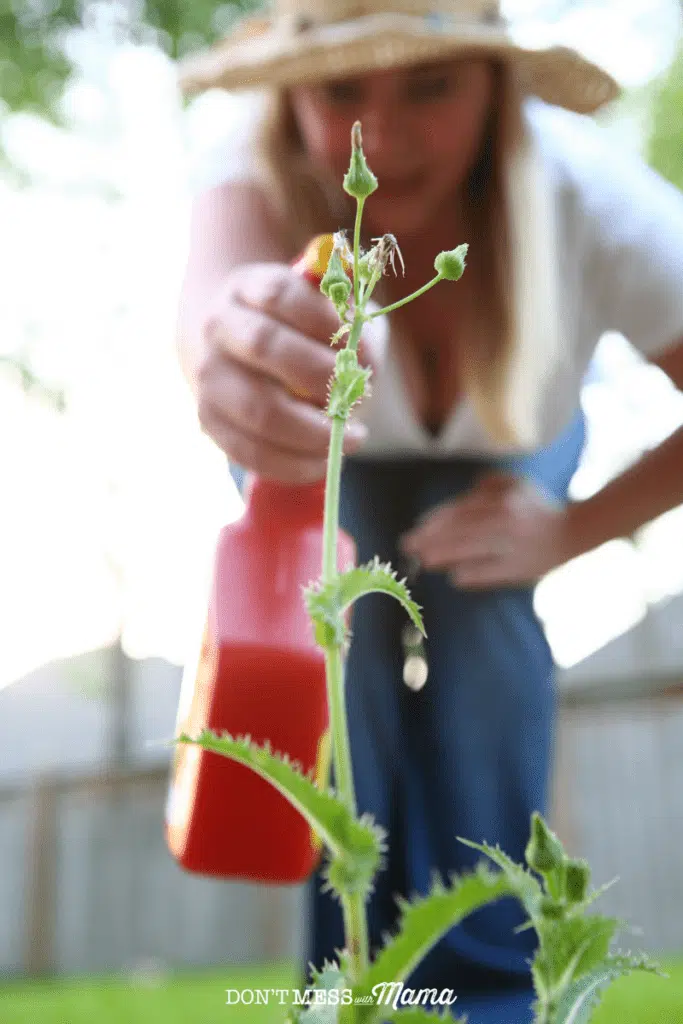
Can I use natural weed killers on my lawn?
It depends. Some ingredients like lemon juice and vinegar can kill grass if you use a lot because they’re both highly acidic. Similarly, Epsom salt and baking used in large quantities can disrupt the pH balance in soil. Some of these DIY natural weed killers are best for spot treatments or small areas rather than an entire lawn.
However, ingredients like cornmeal can be used as a natural weed prevention that you can sprinkle on your lawn. You can also hand-pull weeds to get the entire plant, including the roots, to prevent future growth.
What kills weeds but not grass?
Try corn meal. It’s a natural herbicide that prevents weeds from growing, so it’s best as a prevention method rather than killing active weeds. Just sprinkle over the an area and water lightly to help the cornmeal settle into the soil. Repeat every few months as needed.
You can also hand-pull weeds to get the entire plant, including the roots.
What homemade weed killer is safe for vegetable gardens?
In an area where you’re growing food, you’ll want to take caution. While vinegar, baking soda, and lemon juice are natural ingredients, using them at higher concentrations to kill weeds may inhibit the growth of plants you want to grow like vegetables, fruit, herbs, etc.
There are some natural ways to kill and prevent weeds from growing. Sprinkle cornmeal in vegetable gardens to prevent weeds from growing. Be sure to re-apply every few months or as needed. In addition, you can add ground covers like organic mulch to prevent weed seeds from growing and improve soil health. When weeds pop up, just hand-pull them to ensure you’re removing them at the roots.
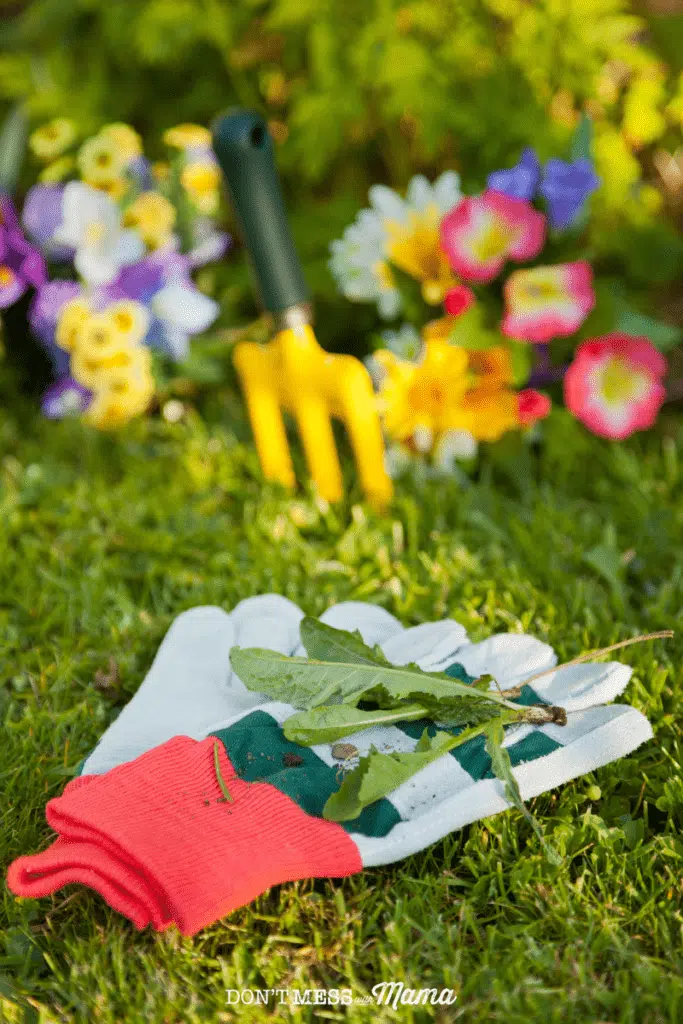
Tips for Using a Homemade Weed Killer
- Take safety precautions like wearing gloves and protective gear like eye goggles when applying natural weed killers to avoid skin irritation.
- Apply natural weed killers on a sunny day when the weeds are actively growing for maximum effectiveness.
- Be careful not to overspray and avoid spraying on desirable plants.
- For larger areas, consider using a pump sprayer for easier application.
- If you’re dealing with tough weeds like dandelions, repeat applications may be necessary.
More Posts You Might Like
Have you tried these natural weed killers? Don’t forget to comment below to let me know how your experience has been. You can also FOLLOW ME on Facebook, Instagram and Pinterest.
Sources:
- https://extension.umd.edu/resource/vinegar-alternative-glyphosate
- https://www.extension.iastate.edu/news/2005/mar/mar0522.htm
- https://specialtycropindustry.com/florida-organic-herbicide-weeds/

